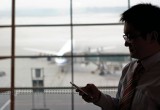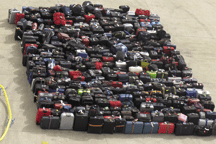The moment of truth for airlines on RFID
 By David C. Wyld, Contributing Editor, AVISIAN Publishing
By David C. Wyld, Contributing Editor, AVISIAN Publishing
Jan Carlzon, the former President of Scandinavian Airlines (SAS), wrote a best-selling business book in 1986, titled Moments of Truth. Carlzon defined the “moment of truth” in any service business as, “anytime a customer comes into contact with any aspect of a business, however remote, (it) is an opportunity to form an impression.” Carlzon emphasized the importance of managing all the small details of the entire airline experience for passengers, in order to generate superior customer satisfaction and loyalty. From this simple “moment of truth” concept, Jan Carlzon took SAS – an airline that was failing at the time – and quickly turned it around to become one of the world’s premier airlines.
When we are standing at the baggage carousel at a remote airport late at night and our bag does not come out of the chute, we are having our very own personal “moment of truth” with the airline that brought us there, but not our luggage. Apparently, more and more of us are having such “moments of truth” with the airlines. According to a recently released report from the U.S. Department of Transportation, U.S. airlines are doing a disastrous job of handling their passengers’ luggage. In fact, the baggage problem is so bad that aggregate statistics for 2005 reveal that U.S. airlines lost, misdirected, or misplaced an average of 10,000 bags each day. In all, the airlines racked up more than 3.5 million problem bags for the year, up significantly from prior years.
Certainly, the ability to deliver a passenger’s checked bag is central to any airline’s value proposition and its basic service promise. Yet, U.S. airlines, strained by financial difficulties, have reached a crisis point in their ability to securely and successfully route you and your bag to your destination at the same time. While more than 98% of “lost” luggage is ultimately found and reunited with its owner, such recovery efforts are costly both in terms of the airlines’ expenses and the loss of goodwill and brand loyalty from the passenger.
Thus, there has been great interest in replacing the current barcode-based luggage tracking and sorting systems with RFID technology. Pilot tests have been conducted at several major airports, showing that RFID can successfully sort and route checked baggage with a 99+% accuracy rate. This represents a quantum leap in accuracy, as industry statistics show that the present barcode systems correctly identify and route between 85 and 90% of all checked baggage. When a bag is not read properly, airline personnel must intervene to correctly route the item in question to its proper final destination. This is a labor intensive process that must be conducted in a limited time, often in the bowels of the airport, on a frigid airport tarmac, or in the belly of a jumbo jet.
We are standing today at the threshold of a real take-off in the application of RFID technology to the very real problem of airline baggage handling. This will only be facilitated by the fact that an industry standard for RFID-based luggage tracking has recently been established. In late November 2005, the member airlines of the International Air Transport Association unanimously adopted IATA standard RP1740c, which specifies the use of UHF tags to track checked baggage.
But where will the money come from in a cash-strapped industry?
The principal hurdle in making the leap to RFID technology in baggage tracking is the question of exactly who should make the investment. While airlines stand to gain greatly in the technological shift from the moment of truth perspective, the financial conditions of the vast preponderance of the airlines are dire. For 2005, U.S. airlines collectively lost over $8 billion. As was recently stated in Supply Chain Review, “the promise of electronic tracking for luggage is still very much a thing of the future as cash strapped airlines are reluctant to invest in the costly technology.” Thus, while Delta was an early leader in investigating RFID, having implemented a successful pilot of the technology in Jacksonville, Florida in 2004, it is very uncertain that the carrier will be able to fulfill its goal of converting to RFID-based baggage handling system-wide by 2007.
In fact, to date, it has been major airports that have taken the lead in actually moving to RFID. Symbol Technologies has already implemented RFID-based baggage tracking and sorting systems at a major airport in both Las Vegas and Hong Kong. While each airport handles approximately 70,000-75,000 checked pieces of luggage daily, they are very different operationally. This is due to the fact that 80-90% of all passengers passing through Las Vegas’ McCarran International Airport originate at or are destined for the gambling mecca, while the predominance (60%) of the passenger load at Hong Kong International Airport are connecting travelers. Another company, FKI Logistex, has won contracts to install such systems at major Asian airports, including:
- Bangkok
- Beijing
- Guangzhou
- Ho Chi Minh City
- Manila
- Seoul
- Shanghai
- Singapore
- Sydney.
The security benefits of an RFID-based solution
Of course, there is also a security benefit to RFID-based baggage tracking, given the increased visibility of such systems. With RFID, it is possible to more closely monitor individual pieces of checked luggage and match the bag to the passenger more quickly. But who should pay for this added anti-terrorism measure – the government, the traveler, the airline, or the airport? Likewise, RFID luggage tags will allow for misdirected bags to be found more quickly and for less luggage to be ultimately declared “lost.” While the passenger ultimately benefits, should RFID tags come at a price to them (perhaps as an option), or should tagging simply be a “cost of doing business” for the airlines?
In the view of Dr. Christian Petschke, Managing Director for BearingPoint’s European Aviation Practice, the shift from barcode-based tracking to RFID for luggage is a matter of when, not if. Speaking for BearingPoint, Dr. Petschke observed that: “We are convinced that RFID will become a standard for baggage handling in the industry, although RFID may not be suitable for every airline and airport in the near term.” In his firm’s RFID Baggage Handling Feasibility Study, issued late last year, BearingPoint identified several key parameters that will determine the suitability of RFID-based baggage tagging for a given airport and/or airline. These include:
- the nature of the operations (hub and spoke versus direct flights)
- the present number of mishandled bags per 1,000 passengers;
- the average direct cost incurred for each bag lost or delayed;
- the cost of RFID tags and readers; and
- the current read rate for the present barcode-based systems.
The business case for RFID-based baggage tagging is indeed a complex one, precisely because it is not just the airlines who will benefit from the crossover to the new technology. While the ROI calculation may be very attractive for the airlines, they are constrained from making such investments in RFID on a wholesale basis, due to the simple fact that their financial difficulties make even attractive process improvement technology unapproachable for many. However, while the technology will certainly have financial, operational, business intelligence, and customer service pay-offs, air carriers may not be able to take the lead in this transition.
Bob McKinley, Vice President Business Development Transportation Markets, Alien Technology, summed it up well: “RFID is an exciting and promising technology that will likely change the landscape of material handling across a broad range of industries, including aviation, just as barcode changed everything 15 years ago. It has the potential of significantly increasing visibility through transportation systems driving greater efficiency, customer service, reduced costs for irregularities, and a much higher level of security. But this can only happen if everyone impacted by the technology works together to leverage its potential.”
David C. Wyld (dwyld @ selu. edu) is the Maurin Professor of Management and Director of the Strategic e-Commerce/e-Government Initiative at Southeastern Louisiana University in Hammond, Louisiana.




